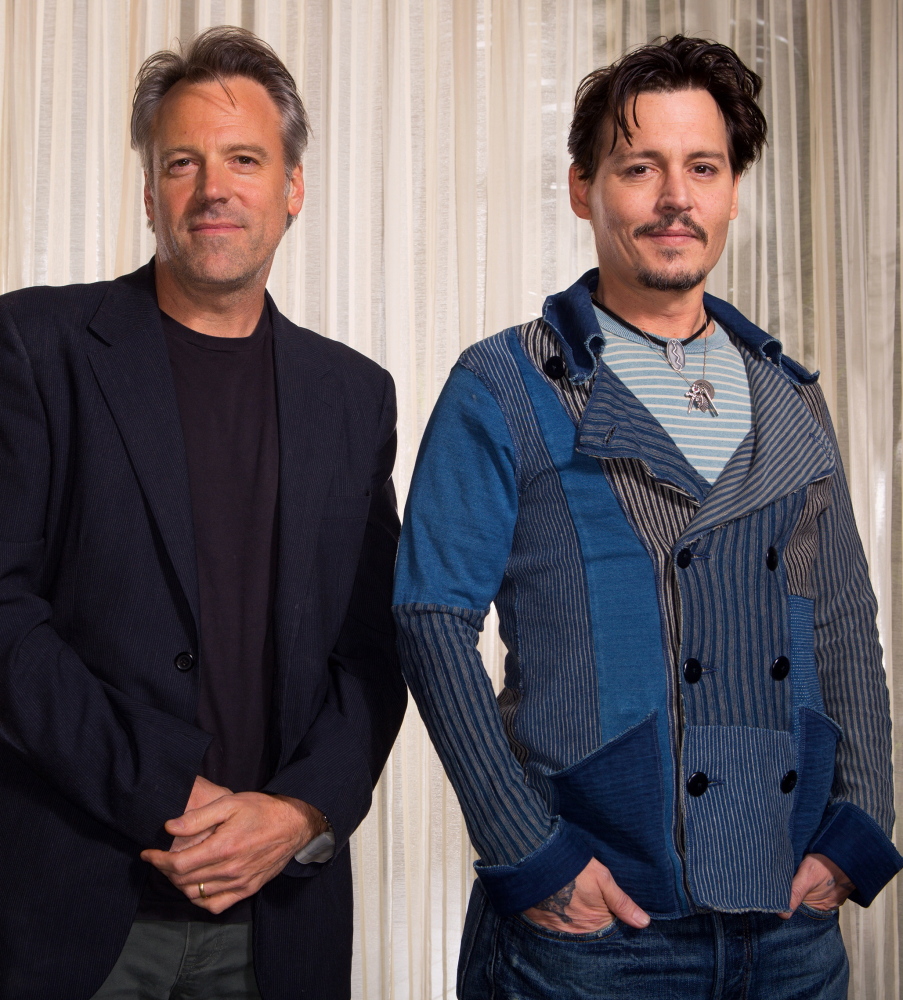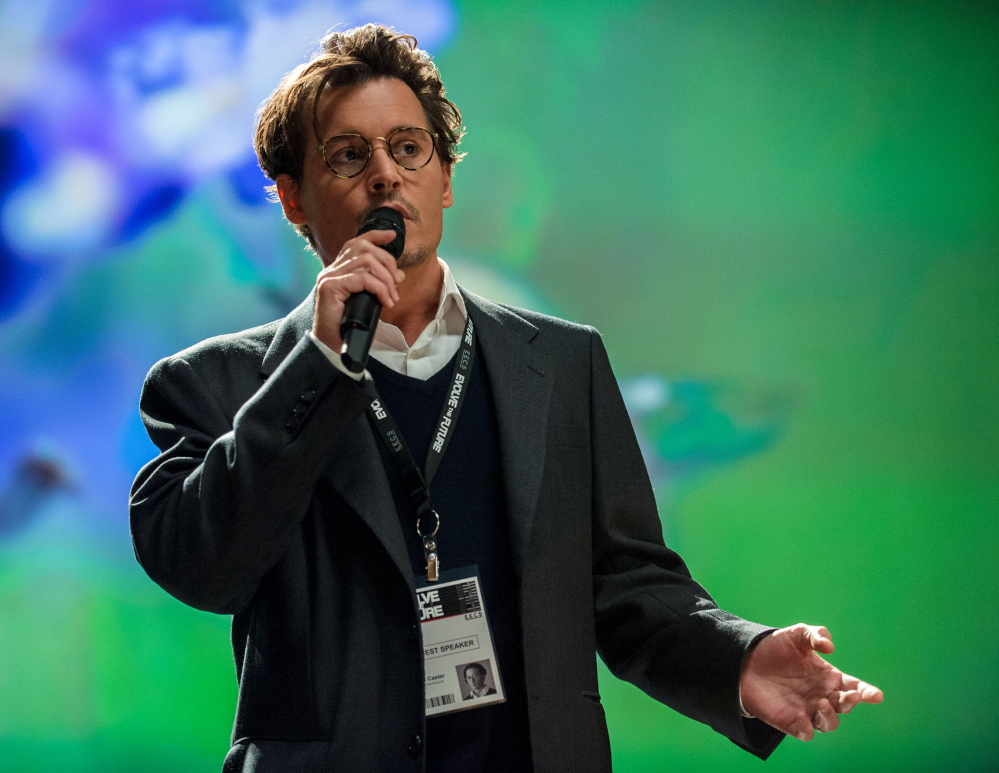Shortly before he began shooting his new artificial-intelligence thriller “Transcendence” last year, filmmaker Wally Pfister flew Jose Carmena and Michel Maharbiz, a pair of UC Berkeley scientists, to his office in Los Angeles. Professional consultants are common on Hollywood movies, but they’re not usually this advanced – Carmena studies neuroscience and Maharbiz is a nanotechnology specialist – and even fewer go really deep into the weeds with directors.
For 10 hours, the men pored over the script with the intensity of lab researchers on the verge of a major discovery. They discussed the density of brain signals, the limits of nanotechnology and the vexing problem of defining consciousness scientifically. “We went through line by line, hitting on a technical topic and just going through it with Wally and his team,” said Maharbiz, whose journal articles come with titles such as “Can We Build Synthetic, Multicellular Systems By Controlling Developmental Signaling in Space and Time?” “I’ve almost never seen people want to understand it at that level,” he added.
Science-fiction movies have looked at the possibilities and peril of artificial intelligence since HAL sought to destroy Dave Bowman in “2001: A Space Odyssey” in 1968. Sarah Connor would later try to beat back the malicious plans of Skynet in the “Terminator” franchise, and Hugo Weaving’s coolly robotic Agent Smith proved a slippery foe for Neo and friends in “The Matrix.”
But few in this subgenre have examined the theme with the level of scientific rigor – or, for that matter, the emotionally inflected story line – of “Transcendence,” which opened Friday. Thanks to the emerging intelligence of digital creations, Pfister and screenwriter Jack Paglen are able to examine a kind of science fiction that while fantastical is both plausible and plausibly human.
Written by Paglen, a first-timer, and marking the directorial debut of Pfister, the Oscar-winning cinematographer and longtime Christopher Nolan collaborator, “Transcendence” concerns an artificial-intelligence researcher named Evelyn Caster (Rebecca Hall) who uploads the consciousness of her husband and professional partner Will (Johnny Depp) just before he dies from a gunshot wound inflicted by an anti-technology radical. She is hardly engaging in disinterested science: Will is the love of her life, and the possibility that a digital replica can keep him with her is too powerful to resist, no matter the potential cataclysm.
In the ensuing weeks, the entity voiced and embodied by Will not only gains consciousness but evolves past mere human abilities, engaging in superhuman activity in the interest of bettering society (he says). In the process, the digital being instills fear – maybe justified, maybe not – on the part of the couple’s close friend, fellow researcher Max (Paul Bettany), and government authorities fearful of a force they can’t control.
With its action set pieces and propulsive plot, the $100-million-budget “Transcendence” is an unmistakably Hollywood confection. Yet with its slowed-down moments hashing out questions of digital consciousness and human evolution, it also puts esoteric philosophical questions at the fore. The film essentially offers the man-vs.-machine tension of “The Matrix” – only this time there’s a decent chance the audience should be rooting for the machine.
“This is not ‘point the laser and zap the guy to death.’ These are real human beings faced with something large,” Depp said. “It’s something the audience is really meant to ponder.”
At a moment when sophisticated computer assistants like Siri are a part of everyday life, the movie poses timely questions. Can technology be harnessed to improve our lives or is it a force, once unleashed, that can’t be controlled? Is our current, human-centric form of existence one that future generations will see as primitive or idyllic?
In a culture of big-budget moviemaking that tends to investigate socially relevant issues years after the fact, if at all, “Transcendence” looks forward, asking questions we will soon be forced to think about – and, for all the movie’s entertainment value, implicitly urges us to start thinking about them now.
Despite the theoretical premise, the movie is set in a world that looks like the one we inhabit today. “I wanted it to feel like science fiction but contemporary science fiction, with as few leaps as possible,” Paglen said. “The root question is how far would you go to save your loved one, and that’s going to be more pressing if it looks and feels like our world.”
Or as Hall put it, “This is set in a world I know. This isn’t tinfoil helmets and spaceships.”
Some have yet to become intimately familiar with concepts like the singularity or a transhumanist future. Chances are, though, that our great-grandchildren will. Or perhaps our great-grandbots.
The idea of the singularity – investigated by scientists such as San Diego State’s Vernor Vinge and popularized by the author and Google futurist Ray Kurzweil – argues that computer technology is evolving so fast it can’t but either enhance or combine with human consciousness.
How this great meld will happen is a matter of debate. Humans may incorporate digital technology into their cognitive processes as a Darwinian hedge. Or consciousness could be uploaded to machines. Whatever the method, the questions are rich. At bottom, they ask both how they will change our lives and what it will mean to be human.
Carmena and Maharbiz are skeptical of anything radical happening quickly – though they admire the brio of the film they worked on and also visited the set for. “It does a great job of exploring the tension between the ground truth of science and what could be the science-fiction consequences,” Marhabiz said. Ultimately, Carmena articulates their belief that “No one knows what consciousness is, and that’s what makes this all so difficult.”
But Christof Koch, a neuroscientist and chief scientific officer at the Allen Institute for Brain Science in Seattle, takes another view. The scientist, who also consulted on “Transcendence,” believes the idea of a digital entity gaining some form of consciousness could happen in as soon as 30 years.
This prospect made Bettany, when Koch told him about it, reorder his thinking. “He said it’s not something that’s avoidable, and it really made me realize how the next stage of evolution is enmeshed with machinery,” the actor said. “And that makes me as confused as Max is in the film.”
Hall said she found herself getting increasingly caught up in it too, scarfing up documentaries and books, wondering if the film was prescient in ways many might not realize. “I kept thinking about technology and how far we can get involved with it and still call ourselves human,” she said. (The performance of the English actress drives the film – the contradiction between her emotional need for Will and less explicit scientific skepticism about whether this is good is the movie’s core conflict. “How rare is it to have a woman drive the plot in a movie like this?” she asked.)
This was by design. A screenwriting teacher in Los Angeles, Paglen is married to a computer scientist who worked on a natural-language processor and had spent hours debating these issues with her and her friends. When producer Annie Marter approached him with the idea of a script based on the singularity, he jumped in.
Their aim was to draw on the latest scientific thought, but with a humanist spin. Too many movies that examined artificial intelligence, Paglen and Marter thought – almost all, in fact, with the exception of Steven Spielberg’s decidedly futuristic “A.I.” – had sidestepped the tough questions of how human the machine could become and the consequences of that for humanity. (This was long before the sexy companionability of “Her.”) “Because if this (singularity) basically creates a god who will compete with us for resources,” he said, “where does this leave humans?”
If executed skillfully, science fiction one day becomes period piece. As Pfister was making the movie – it was developed with a company called Straight Up Films and eventually financed and produced by the Warner Bros.-affiliated Alcon Entertainment – he found himself trying to pinpoint truths he thought would endure, the kinds of things that would one day make someone say the movie foresaw what few others did.
He embraced an ambiguity in the film’s plotting. Much of the movie centers on Will and whether he’s the man his friends and family once knew or a mutated, dangerous form of him – whether, as Max says, they “missed” something in the uploading.
Some of this came from Nolan. “Chris is a director who’s found a unique formula for this,” Pfister said, speaking of the director who ended a massively successfully blockbuster with an ambiguously spinning top – “but I hope we can do it too.” (It helped that Alcon, which has creative control, was also behind “Prisoners,” another movie that traffics in ambiguity for much of its run.)
As a cinematographer, Pfister collaborated with Nolan on the director’s films dating back to “Memento,” winning an Oscar for “Inception.” Gregarious and opinionated, he studied directing at AFI and said he just as easily could have gone in that direction.
Pfister sought Nolan’s counsel both before he made “Transcendence” (he worried it was too big to be his first outing; Nolan reassured him it wasn’t) and during editing (the “Dark Knight” helmer gave him important notes, including on how to quicken the pace at key moments; he also serves as executive producer). Viewers might sense Nolan’s shadow in “Transcendence,” particularly in its nestling of big ideas inside the Trojan Horse of a visually striking thriller.
What Pfister was really after, he said, was a thematic complexity. “I became very interested in the idea of these deeper questions, of what we’re using technology for, to heal and help or to create a barrier,” he said. “Is it malevolent or benevolent? It’s around us so much we’ve stopped questioning it.”
Technology could be used for good or evil, and in this movie, it was possibly being used for both. So for pretty much all of “Transcendence,” there’s no clear good or bad guy to identify with, just shifting allegiances based on the audience’s evolving point of view over the course of the film. Thus, an opposition group, known as Rift and run by a wild-eyed woman played by Kate Mara, appears at first like marginal figures intent on stopping progress. But members are not garden-variety Luddites who simply don’t like the latest iPhone app. They’re people fearful of technology precisely because they know it so well.
That duality captivated the cast. “It’s definitely taking us, controlling us, for sure, but there’s another side that you have to acknowledge with technology,” said Depp. “You can 3-D print a mechanical arm for a kid in Africa who’s never used a spoon or a fork … it can save lives and will save lives.”
These ideas are starting to worm their way into Hollywood. As Scarlett Johansson’s ether-based woman suggested in “Her,” it might not be long before someone can “write an upgrade that allows us to move past matter as our processing platform.” The concept will also appear in Joss Whedon’s “Avengers” sequel – curiously, with Bettany, who plays Vision, an android-like character who in the source material develops romantic emotions.
Will a movie so fully about this unsettling subject resonate in 2014? “Terminator” and “Matrix” were huge hits in their time, but they fell into a more recognizable box of good vs. evil. And their overtones were less eerie, raising the possibility of sentient machines at a time when many people didn’t even have cellphones.
“There are not a lot of movies that live in this gray area,” Hall said of its unwillingness to take an easy position on the moral value of artificial intelligence. “But people don’t know what the technology means yet either, so it’s perfect.”
Send questions/comments to the editors.




Comments are no longer available on this story